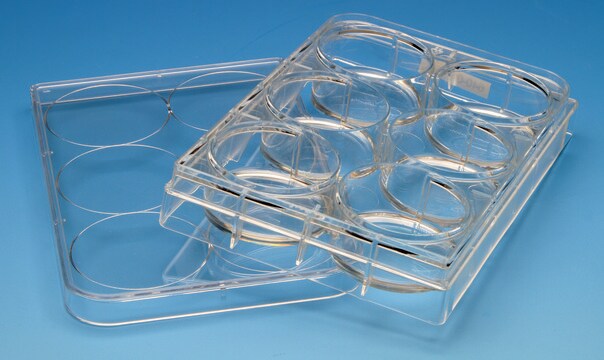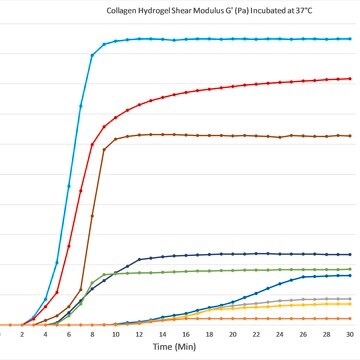Recommended Products
sterility
irradiated
form
solid
packaging
pack of 5 plates
technique(s)
cell culture | mammalian: suitable
capacity
2.0-3.0 mL
size
6 wells
surface area
9.5 cm2
solubility
water: insoluble
Related Categories
General description
The silicone substrates of CytoSoft® products are optically clear and have a low auto-florescence. The layer of silicone in each well is firmly bonded to the bottom of the well. Unlike hydrogels (such as polyacrylamide gels), silicone gels are not susceptible to hydrolysis, do not dry nor swell, are resilient and resistant to tearing or cracking, and their elastic moduli (rigidities) remain nearly unchanged during extended storage periods.
CytoSoft® products accommodate the harvesting of cells using enzymes such as trypsin and collagenase. There is no biochemical breakdown of the substrate during or after enzyme treatment, and there are no residuals of the substrate in the sample retrieved from a CytoSoft® plate.
This CytoSoft® product, Catalog Number 5140, has an elastic modulus of approximately 0.5 kPa in a standard flat-bottom 6-well plate. The thickness of the silicone gel is uniform with a ~0.5 mm thick layer of silicone in each well that is fully compatible with mammalian cell cultures. The plates are packaged individually, sterilized using irradiation and provided with 5 plates per package.
Legal Information
Storage Class
13 - Non Combustible Solids
wgk_germany
WGK 3
flash_point_f
Not applicable
flash_point_c
Not applicable
Certificates of Analysis (COA)
Search for Certificates of Analysis (COA) by entering the products Lot/Batch Number. Lot and Batch Numbers can be found on a product’s label following the words ‘Lot’ or ‘Batch’.
Already Own This Product?
Find documentation for the products that you have recently purchased in the Document Library.
Articles
CytoSoft® elastic modulus plates are cell culture tools used to accurately analyze the effect of substrate stiffness/rigidity on cell behavior for mechanobiology applications covering a broad physiological range of 0.2 kPA- 64 kPa.
Extracellular matrix proteins such as laminin, collagen, and fibronectin can be used as cell attachment substrates in cell culture.
Our team of scientists has experience in all areas of research including Life Science, Material Science, Chemical Synthesis, Chromatography, Analytical and many others.
Contact Technical Service

